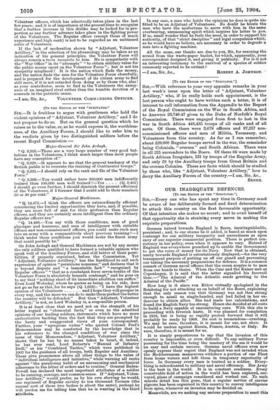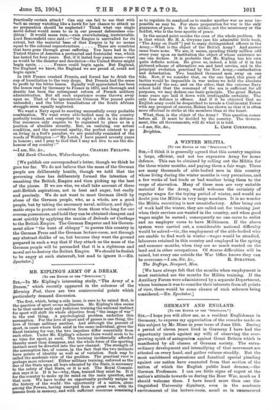requisite preparations.
German hatred "towards England is fierce, inextinguishable, persistent; and, to our shame be it added, is based as much upon contempt for our military incapacity and unreadiness as upon envy of our superior commercial position. There is perfect con- sistency in her policy, even when it appears to vary. Hatred of England was everywhere preached up to enable the Government to get the votes of money for its Navy. Now that is obtained, amity towards England is ostentatiously displayed,—for the very transparent purpose of putting us off our guard and preventing our taking the necessary preparations for defence. It is a common remark of German naval officers that the ocean sceptre is to pass from our hands to theirs. When the Czar and the Kaiser met at Copenhagen, it is said that the latter signalled his farewell thus:—" The Admiral of the Atlantic sends greeting to the Admiral of the Pacific."
How long is it since von Billow virtually apologised in the Reichstag for not attacking us on behalf of the Boers, explaining that the only reason was that Germany was not then strong enough to assail us single-handed, and had failed in her en- deavour to obtain allies. She had made her calculations, and found the English Navy too strong. Hence she decided at all costs to build a Navy capable of encountering ours. With this she is proceeding with feverish haste. It was planned for completion in 1916, but is being so rapidly pushed forward that it will probably be ready by 1908. Its cost is tremendous—crushing. We may be sure, therefore, it is meant for use, not show. It would be useless against Russia, France, Austria, or Italy. Be sure, therefore, it is meant for us.
It is simply preposterous to say that the invasion of this country is impossible, or even difficult. To any military Power possessing for the time being the mastery of the sea it would be an easy and certain success. German naval officers even now openly express their regret that England was not invaded when the Mediterranean manceuvres withdrew a portion of our Fleet from home waters and left them in temporary superiority of force. In Germany every man is trained as a soldier. Every- thing is subordinated to military and naval efficiency. Her Army is the beat in the world. It is in constant readiness. Every conceivable field of action in the world has been explored, sur- veyed, plans of campaign considered and worked out. To such minute detail has this gone, that a regular service of carrier pigeons has been organised in this country to convey intelligence from spies, whenever an invasion may be decided on.
Meanwhile, are we making any serious preparation to meet this
Practically certain attack ? Can any one fail to see that with Such an enemy watching like a hawk for her chance to attack us no preparation should be neglected ? Think what one single naval defeat would mean to us in our present defenceless con- dition! It would mean ruin,--ruin overwhelming, irretrievable. Lord Beaconsfield once said:—" Our Empire is unrivalled for its extent, but the material base of that Empire is by no means equal to the colossal superstructure There are countries that have gone through great suffering. Yon have had in the United States of America a protracted and fratricidal war, which has lasted for four years. But, if it lasted four years more—vast as would be the disaster and desolation—the United States might begin again France could begin again. But England, the England we know, the England we are proud of, could not begin again."
In 1805 France crushed Prussia, and forced her to drink the cup of humiliation to the very dregs. But Prussia had the sense to profit by the bitter lesson. Equally well appreciated has been the lesson read by Germany to France in 1870, and thorough and drastic has been the subsequent reform of French military administration. But all such experience seems thrown away upon us. That of the ignominious Crimean War passed quite unheeded; and the bitter humiliations of the South African struggle seem equally neglected.
We want a Navy equal to meeting successfully every probable combination. We want every able-bodied man in the country perfectly trained, and competent to sight a rifle in its defence. Our resources only require to be organised to place us in a Position of absolute security. But, on realising. our actual condition, and the universal apathy, the perfect content to go on living in a fool's paradise, we are painfully reminded of the words of Wellington:—" My Lords, I have passed seventy years in honour ; and I pray to God that I may not live to see the dis- honour of my country !"
am, Sir, &c., CHARLES FELLOWS.
Old Bank Chambers, Wolverhampton.
[We publish our correspondent's letter, though we think he goes too far. We do not believe that the mass of the German people are deliberately hostile, though we hold that the governing class has deliberately formed the intention of smashing the British. Empire and then picking up the best of the pieces. If we are wise, we shall take account of these anti-British aspirations, not in heat and anger, but coolly and precisely. We do not want to meet German illwill by abuse of the German people, who, as a whole, are a good people, but by taking the necessary naval, military, and diplo- matic steps to protect ourselves from those who long for our oversea possessions, and hold they can be obtained cheapest and most quickly by applying the maxim of Delencla est Carthago to the British Empire. The German Emperor and his Govern- ment allow "the hunt of obloquy" to pursue this country in the German Press and the German lecture-room, not through
any abstract dislike of us, but because they want the ground prepared in such a way that if they attack us the mass of the German people will be persuaded that it is a righteous and moral act to destroy the British Empire. We should be foolish to be angry at such statecraft, but mad to ignore it.—En.
MR. KIPLING'S ARMY OF A DREAM.



























































 Previous page
Previous page